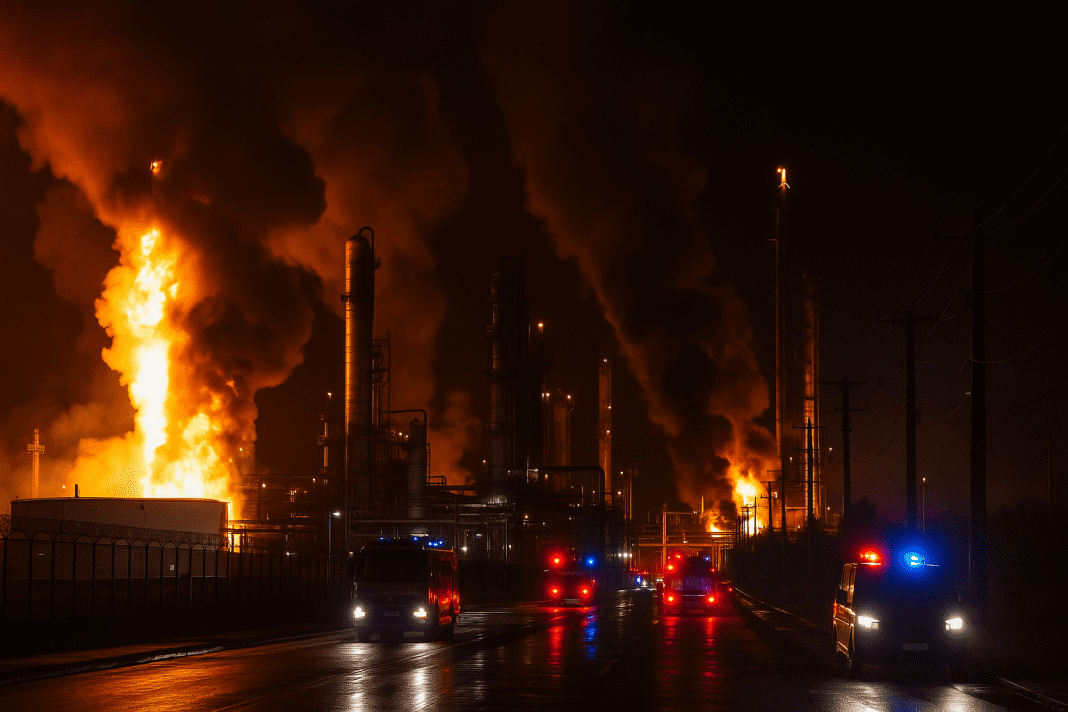Two major oil refineries in Eastern Europe — one in Romania and another in Hungary — were hit by powerful explosions late on October 20, raising concerns across the region. Both facilities are connected to Russian oil companies or rely heavily on Russian crude imports, putting the incidents under close international scrutiny.
The explosions occurred almost simultaneously at the Petrotel-Lukoil refinery in Ploiesti, Romania, and the Danube Refinery in Százhalombatta, Hungary, according to local media reports. Authorities in both countries have begun investigations, but as of now, the causes remain unclear.
Blast at Romania’s Petrotel-Lukoil Refinery
The first explosion took place around midday at the Petrotel-Lukoil refinery, located in the southern Romanian city of Ploiesti. The facility is owned by a subsidiary of Lukoil, one of Russia’s largest private oil and gas companies.
Reports from Romanian media indicate that the refinery had been offline since October 17 for a scheduled technical inspection. Despite this, a blast occurred while limited maintenance work was underway.
Emergency services quickly arrived on site, and firefighters managed to prevent the blaze from spreading to nearby structures. One 57-year-old worker sustained serious head and leg injuries and was immediately taken to intensive care.
Local authorities have not ruled out any possible cause, including human error, technical malfunction, or deliberate sabotage. Given recent Ukrainian drone strikes on Russian energy infrastructure, security analysts say investigators are likely examining all scenarios.
The Petrotel facility is significant because it refines Russian crude oil that enters Romania through Black Sea shipping routes. Even after the European Union’s sanctions on Russian energy, Romania remains one of several EU members still processing Russian-linked petroleum products due to transitional exemptions.
Fire Erupts at Hungary’s Danube Refinery
A few hours later, a second explosion struck the Danube Refinery in Százhalombatta, about 27 kilometers (17 miles) southwest of Budapest. The plant is Hungary’s largest oil-processing facility and is operated by the MOL Group, a leading Hungarian oil company.
According to the Hungarian news outlet Telex, the explosion triggered a large fire visible from nearby towns. Residents reported hearing loud booms followed by columns of smoke rising into the night sky. Firefighters battled the flames for several hours and finally contained the blaze by the morning of October 21.
Fortunately, there were no fatalities or serious injuries reported. MOL stated that all staff were safely evacuated and that emergency systems worked as intended.
The refinery is considered Hungary’s most advanced in terms of oil refining capacity and plays a key role in fuel distribution across Central Europe. It receives much of its crude oil through the Druzhba (Friendship) Pipeline, which connects Hungary directly to Russian supply lines.
Telex reported that “special maintenance work” was being conducted at the plant on the night of the fire, although official company statements said no open-flame operations, such as welding, were taking place.
Ukraine’s refinery strikes ripple through global markets turning India into unexpected energy winner
One of the refinery’s most critical units — a distillation tower used to separate oil components — may have been affected. Industry analyst Tamas Pletser explained that if the tower was not damaged, repairs could take a few weeks, but if it was, restoration could last up to a year.
Authorities have sealed off the area, and an official technical investigation is underway to determine what caused the explosion.
Regional Impact and Broader Context
The timing of the incidents drew attention because they occurred just hours before Russia’s Novokuibyshevsk oil refinery, located in the Volga region, also halted operations after a reported drone strike, according to Reuters. That Russian facility is part of the Rosneft Samara refinery group, which includes several key plants supplying domestic and export markets.
Although Ukraine has not commented on the refinery explosions in Romania or Hungary, nor on the Russian refinery attack, the events have reignited discussion about the vulnerability of Europe’s energy network.
Both the Romanian and Hungarian refineries have direct or indirect ties to Russian energy infrastructure — a sensitive issue as the European Union continues to push for energy independence from Moscow following the invasion of Ukraine in 2022.
The Petrotel-Lukoil plant in Romania has faced previous scrutiny for its ownership links, while the Danube Refinery’s reliance on the Druzhba pipeline makes it a crucial but risky asset for Hungary, which remains one of the EU countries most dependent on Russian oil.
The dual incidents also underscore how industrial safety, energy politics, and regional security are increasingly intertwined. Investigators in both nations have stressed that no official cause has been confirmed, but they are exploring every possibility, from mechanical faults to external interference.
For now, local officials in both Romania and Hungary have assured citizens that there is no environmental risk and that fuel supplies remain stable. Still, the explosions have disrupted refinery operations and prompted heightened vigilance across the region.
Precision drone attack turns Volgograd oil refinery into towering fireball
The coming days will be crucial as authorities assess the extent of the damage and resume production at the affected sites. Until then, both countries remain on alert, as investigators work to determine whether the near-simultaneous explosions were coincidental industrial accidents — or something far more complex.

